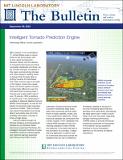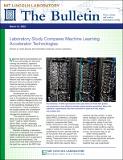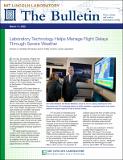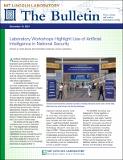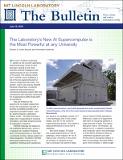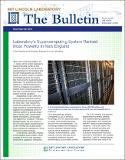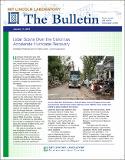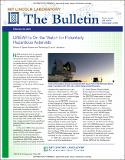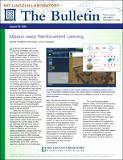Browsing LLSC in the News by Title
Now showing items 34-53 of 83
-
Intelligent Tornado Prediction Engine
(2022-11-09)The most common type of tornado in the Southeast region of the United States, known as a quasi-linear convective system tornado, is historically difficult to warn for, with lead times hovering under 7 minutes and a false ... -
Laboratory Study Compares Machine Learning Accelerator Technologies
(2023-09-28)Dr. Albert Reuther, Senior Staff, Lincoln Laboratory Supercomputing Center (LLSC), is leading a Laboratory study that investigates and compares machine learning accelerators to better understand each accelerator’s strengths ... -
Laboratory Technology Helps Manage Flight Delays Through Severe Weather
(2022-11-10)Historically, air traffic controllers (ATCs) have relied on past experience and looked at weather forecasts themselves to understand and prepare in advance for weather that could impact the flow of traffic. A MIT Lincoln ... -
Laboratory Workshops Highlight Use of Artificial Intelligence in National Security
(2022-04-05)Teams at MIT Lincoln Laboratory are using AI to address national security challenges in collaboration with other organizations. To facilitate this research and promote collaboration with other organizations, the Laboratory ... -
The Laboratory’s New AI Supercomputer is the Most Powerful at any University
(MIT Lincoln Laboratory, 2019-07-19)The new TX-GAIA computing system at the Lincoln Laboratory Supercomputing Center (LLSC) has been ranked as the most powerful artificial intelligence (AI) supercomputer at any university in the world. The ranking comes from ... -
Laboratory’s Supercomputing System Ranked Most Powerful in New England
(MIT Lincoln Laboratory, 2016-12-02)The new computing system, TX-Green, at the Lincoln Laboratory Supercomputing Center (LLSC) has been named the most powerful supercomputer in New England and the 3rd most powerful at a United States university on the TOP500 ... -
Lidar Scans Over the Carolinas Accelerate Hurricane Recovery
(MIT Lincoln Laboratory, 2019-01-11)The Federal Emergency Management Agency (FEMA) called upon MIT Lincoln Laboratory to use its state-of-the-art light detection and ranging (lidar) system to image the destruction from hurricane Florence. A high-resolution ... -
LINEAR Is On the Watch for Potentially Hazardous Asteroids
(MIT Lincoln Laboratory, 2021-02-05)NASA estimates that an asteroid the size of a car enters Earth’s atmosphere about once a year, creating a great fireball while burning up before reaching Earth’s surface; and roughly every 2,000 years, a football-stadium-sized ... -
LLx Project Seeks to Improve Online Hands-On Learning
(MIT Lincoln Laboratory, 2019-12-06)Online learning has been around for decades, but educators still struggle to adapt certain hands-on subjects to the web. At MIT Lincoln Laboratory, a team of researchers has been working on ways to close this practical ... -
MagNav Project Successfully Demonstrates Real-Time Magnetic Navigation
(DAF-MIT AI Accelerator, 2023-05-26)In a groundbreaking achievement, the Department of the Air Force-Massachusetts Institute of Technology Artificial Intelligence Accelerator (AIA) MagNav project performed real-time magnetic navigation (MagNav) on the C-17A ... -
Mission-ready Reinforcement Learning
(MIT Lincoln Laboratory, 2020-08-28)The Mission-ready reinforcement learning (MeRLin) program is looking to solve complex planning and coordination problems across a range of Department of Defense mission areas. MeRLin is focusing on developing and training ... -
MIT and Stanford researchers develop operating system with one major promise: Resisting ransomware
(Cyberscoop, 2023-04-21)Computer science researchers at MIT and Stanford are developing an operating system with built-in cybersecurity defenses. -
MIT and U.S. Air Force Sign Agreement to Launch AI Accelerator
(MIT Lincoln Laboratory, 2019-07-12)MIT and the U.S. Air Force have signed an agreement to launch a new program designed to make fundamental advances in artificial intelligence that could improve Air Force operations while also addressing broader societal ... -
MIT joins White House supercomputing effort to speed up search for Covid-19 solutions
(MIT News, 2020-03-23)MIT joins a consortium of supercomputing facilities to help speed the search for COVID-19 solutions. -
MIT Lincoln Lab Offers Advice for Delivering On-Demand HPC
(HPCwire, 2019-03-11)Looking for advice on how to deliver HPC to a diverse science user community? MIT’s Lincoln Laboratory has just posted a new paper – Lessons Learned from a Decade of Providing Interactive, On-Demand High Performance Computing ... -
MIT Lincoln Laboratory Takes the Mystery Out of Supercomputing
(insideHPC, 2017-01-18)In this special guest feature, Dr. Jeremy Kepner from MIT Lincoln Laboratory describes the lab’s approach to developing algorithms that will keep their users productive as new processing technologies evolve. -
MIT Researchers Turn to Unity 3D Game Engine for Supercomputer Diagnostics
(www.tomshardware.com, 2021-10-29)To speed up the process of monitoring, diagnosing, and fixing problems with multi-billion-dollar supercomputers researchers from the Laboratory and MIT have developed a new technology to visualize node monitoring, offering ... -
MIT SuperCloud
(MIT Lincoln Laboratory, 2015-05-08)The “big data” problem is pervasive across the DoD and is most commonly characterized by the three “Vs” of big data: volume, velocity, and variety. Now, increasingly, a fourth “V”, veracity (i.e., security), is becoming ... -
Multimodal Vision for 3D Scene Interpretation
(2023-12-18)The MIT Lincoln Laboratory project Multimodal Vision for 3D Scene Interpretation (MMV3D) translates multiple types of 2D imagery to create a 3D image that more accurately captures complex multi-surface geometry. -
National Program Provides Real Cybersecurity Experience
(University of Arizona College of Engineering News, 2023-02-03)A team of University of Arizona graduate students was matched in spring 2022 with technical directors Jeremy Kepner and Hayden Jananthan from MIT Lincoln Laboratory to better identify the cyber characteristics of large-scale ...
